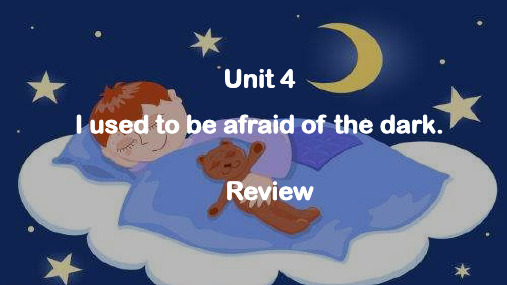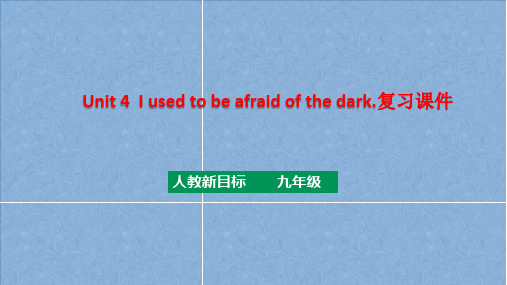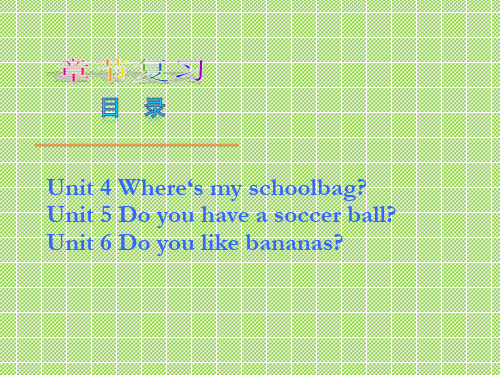Unit 4 复习课件
合集下载
人教八年级下册 Unit 4 复习课件 (共70张PPT)

一直 同意 今后 在未来 做家庭作业 上网 看电影
all the time agree with in future in the future do homework use the Internet watch movies
单词拼写
1.—Can you go to a movie with us tonight? —Sorry,my parents don't aa_l_l_ow____ me to go out at night. 2.—My mobile phone doesn't work. —There must be something w_w__ro_n_g__ with it. 3.—Who's that young woman? —I don't know.I g_g_u_e_s_s__ she is Kate's aunt. 4.—Mom,Jill made my room dirty. —Oh,it's not a big d_d_e_a_l__.After all she's a 3-year-old girl. 5.He didn't leave u__u_n_t_il_ the rain stopped.
3.I found my sister looking through my things yesterday. 昨天我发现我的姐姐正在看我的东西。 ①find sb./sth.doing sth.意为“发现某人/某物正在做某事”,属于“find +宾语+宾补”结构。
我发现他正在田间劳作。
I found him working in the fields. ②look through 浏览 【拓展】look after照顾;照看 look for寻找
unit 4【复习课件】七年级英语下册单元复习(人教版)

别把脏碗留在厨房里!
10. I can’t relax on weekends __e_it_h_e_r___ _b_e_c_a_u_se___ I have to
learn to play the piano. 周末我也不能放松, 因为我不得不去学习弹钢琴。
重点语法
祈使句
用于表达命令、请求、劝告、警告、禁止等的句子称为 祈使句。祈使句最常用于表达命令。祈使句因对象(即主语) 是第二人称, 所以通常省略主语而以动词原形开头。祈使句句 末使用句号或感叹号。为表示语气委婉, 可在句首或句尾加 please, please放在句尾时, 前面通常加逗号。
Let me help you. 让我来帮你。
重点语法
祈使句
考题:[ 广元] —________ silent, please! You are in the library.
—I’m sorry, madam.
A. Keep
B. To keep
C. Keeping
D. Kept
重点语法
祈使句
否定祈使句的形式:
重点单词
1. rule n. 规则; 规章→____s_c_h_o_o_l_r_u_le_s___学校规则 2. arrive v. 到达→ ___a_r_r_iv_e__in_/_a_t._..__到达……
→ar_r_i_v_e_l_a_te__fo_r__sc_h上oo学l 迟到 3. fight v.& n. 打架; 战斗→ __f_ig_h__t _a_g_a_in_s_t_s_b_.和某人打斗→
→_____fo_l_lo_w__in_g____n. 下列事物
重点单词
30. learn v. 学习; 学会→ _le_a_r_n__to__d_o_s_t_h_.____学习做某事 → ____l_ea_r_n__fr_o_m__s_b_.向某人学习 → ____l_e_a_rn__a_b_o_u_t了解; 获悉
10. I can’t relax on weekends __e_it_h_e_r___ _b_e_c_a_u_se___ I have to
learn to play the piano. 周末我也不能放松, 因为我不得不去学习弹钢琴。
重点语法
祈使句
用于表达命令、请求、劝告、警告、禁止等的句子称为 祈使句。祈使句最常用于表达命令。祈使句因对象(即主语) 是第二人称, 所以通常省略主语而以动词原形开头。祈使句句 末使用句号或感叹号。为表示语气委婉, 可在句首或句尾加 please, please放在句尾时, 前面通常加逗号。
Let me help you. 让我来帮你。
重点语法
祈使句
考题:[ 广元] —________ silent, please! You are in the library.
—I’m sorry, madam.
A. Keep
B. To keep
C. Keeping
D. Kept
重点语法
祈使句
否定祈使句的形式:
重点单词
1. rule n. 规则; 规章→____s_c_h_o_o_l_r_u_le_s___学校规则 2. arrive v. 到达→ ___a_r_r_iv_e__in_/_a_t._..__到达……
→ar_r_i_v_e_l_a_te__fo_r__sc_h上oo学l 迟到 3. fight v.& n. 打架; 战斗→ __f_ig_h__t _a_g_a_in_s_t_s_b_.和某人打斗→
→_____fo_l_lo_w__in_g____n. 下列事物
重点单词
30. learn v. 学习; 学会→ _le_a_r_n__to__d_o_s_t_h_.____学习做某事 → ____l_ea_r_n__fr_o_m__s_b_.向某人学习 → ____l_e_a_rn__a_b_o_u_t了解; 获悉
人教 七上英语Unit4 复习课件(共16张PPT)

keys books
读一读,译一译,拼一拼,猜一猜。
bed bookcase chair a set of keys clock phone sofa table desk next to(在......旁边) Game: guess my mouth(猜口型)
对话时刻:你问我答
Where is your book? It's in the desk. It's on the desk. It's under the desk. It's next to the desk.
据黑板图俩俩对话,用where are互问互答,每 人两句,基础分2分每组,声音洪亮2分.
This is Mr. Wang’s room. His bed is _o_n_ the floor. The bookcase is _n__ex_t_ _t_o__ the bed. The clock is __o_n_the wall. The dog is ___o_n_ the chair. A set of keys and a phone are _o_n_ the desk. What’s ___in___ the box? It’s his basketball. Where _i_s_ his TV?I don’t__k_n_o_w_.
Unit4 Where's my schoolbag? Revision(复习课)
bed
bookcase
chairs
keys
clock
phone
What’s in the house?
Living room
table sofa sofas
schoolbag
读一读,译一译,拼一拼,猜一猜。
bed bookcase chair a set of keys clock phone sofa table desk next to(在......旁边) Game: guess my mouth(猜口型)
对话时刻:你问我答
Where is your book? It's in the desk. It's on the desk. It's under the desk. It's next to the desk.
据黑板图俩俩对话,用where are互问互答,每 人两句,基础分2分每组,声音洪亮2分.
This is Mr. Wang’s room. His bed is _o_n_ the floor. The bookcase is _n__ex_t_ _t_o__ the bed. The clock is __o_n_the wall. The dog is ___o_n_ the chair. A set of keys and a phone are _o_n_ the desk. What’s ___in___ the box? It’s his basketball. Where _i_s_ his TV?I don’t__k_n_o_w_.
Unit4 Where's my schoolbag? Revision(复习课)
bed
bookcase
chairs
keys
clock
phone
What’s in the house?
Living room
table sofa sofas
schoolbag
Unit 4 (单元复习课件)-九年级英语全一册(人教新目标Go for it!)

change and how it happened
审题 1.审主题: 我的变化 2. 审体裁: 说明文 3.审人称: 第一人称 4.审时态: 一般过去时,一般现在时 5. 审要点: 过去与现在的对比
Writing
Follow the prompts to write an article to talk about your change.
A.Even
B.Even though C.If
D.Unless
(A)4. You can made a _____ instead of him.He doesn't have to go
there_____ person.
A.decision;in B.decide;in C.decision;by D.decide;by
05 Writing
Writing
Write about how you have changed. What did you use to be like? Which change is the most important one and why?
Try to write two paragraphs. Paragraph 1: General introduction about the changes in your life Paragraph 2: The most important
Language points
Point 7.Now she’s not shy anymore and loves singing in front of crowds. not ... anymore = no more,不再 e.g:He doesn't come late anymore.
审题 1.审主题: 我的变化 2. 审体裁: 说明文 3.审人称: 第一人称 4.审时态: 一般过去时,一般现在时 5. 审要点: 过去与现在的对比
Writing
Follow the prompts to write an article to talk about your change.
A.Even
B.Even though C.If
D.Unless
(A)4. You can made a _____ instead of him.He doesn't have to go
there_____ person.
A.decision;in B.decide;in C.decision;by D.decide;by
05 Writing
Writing
Write about how you have changed. What did you use to be like? Which change is the most important one and why?
Try to write two paragraphs. Paragraph 1: General introduction about the changes in your life Paragraph 2: The most important
Language points
Point 7.Now she’s not shy anymore and loves singing in front of crowds. not ... anymore = no more,不再 e.g:He doesn't come late anymore.
人教版英语九年级全册Unit4复习课件

不,我上班了。/是的,我没上班。
2. What’s he like now? 他现在什么样子? What +be +主语+like? 用来询问某人的外 貌特征,意为“…长什么样?”,相当于what do /does +主语+like? ►---What’s your brother like?=What does your brother like? 你哥哥张什么样? 辨析:be like 和look like be like: “像…一样”,常指品德、相貌等相像 ,
= I don’t know what they do with the problem.
2) 动词不定式短语 to deal with 后必须带宾语。 ► I don’t know how to deal with it.
我不知道如何处理这件事。
(3)shyness 名词,意为“害羞;腼腆”是形 容词shy 加后缀-ness 构成的名词。 ► He can’t get over his shyness. 拓展:sad -------- sadness
in the front of :“在…… 的前部”,强调在某一 物体内部的前面
(3)whole 形容词,意为“整个的;全部的”,常 用结构为“the+whole+单数名词”。all也有 此意,但语序不同:all用于冠词、所有格 或其他限定词之前;whole用于冠词、所有 格及其他限定词之后。
all the time
Grammar Focus
I used to be short
I didn’t use to be popular in school.
Paula used to be really quiet.
2. What’s he like now? 他现在什么样子? What +be +主语+like? 用来询问某人的外 貌特征,意为“…长什么样?”,相当于what do /does +主语+like? ►---What’s your brother like?=What does your brother like? 你哥哥张什么样? 辨析:be like 和look like be like: “像…一样”,常指品德、相貌等相像 ,
= I don’t know what they do with the problem.
2) 动词不定式短语 to deal with 后必须带宾语。 ► I don’t know how to deal with it.
我不知道如何处理这件事。
(3)shyness 名词,意为“害羞;腼腆”是形 容词shy 加后缀-ness 构成的名词。 ► He can’t get over his shyness. 拓展:sad -------- sadness
in the front of :“在…… 的前部”,强调在某一 物体内部的前面
(3)whole 形容词,意为“整个的;全部的”,常 用结构为“the+whole+单数名词”。all也有 此意,但语序不同:all用于冠词、所有格 或其他限定词之前;whole用于冠词、所有 格及其他限定词之后。
all the time
Grammar Focus
I used to be short
I didn’t use to be popular in school.
Paula used to be really quiet.
Units4-6复习课件课件(人教新目标七年级上)

_______i_sn_'t___otnhe watch?
2.Her hat is on the chair. (改为否定句)
Are these
Her hat ________ ____ the chair.
3. These are my books.(改为一般疑问句)
___I_s___ ________o_n_ your books?
Unit 5┃ 基础知识梳理
we
9. 我们 _la_te______ 10. 迟到 网__球___w_a_tc_h___ 11. 注视;观乒看乓球_____________ 12. tenni班s 级_;__(一__节__)课____
相同的
13. ping-p爱o;ng喜爱______________ 14. class允_许__;_让__________________ 15.sam有e趣的______________ 16.love玩;__打_(_球_)_________ 17.let __________________
Unit 4┃ 基础知识梳理
3. “你的书在哪儿?” “它W们her在e o椅n 子ar上e 。” —___________ _______ your books? —They araere___in_ the chair. 4. 钥匙在书架上。 The keys ______ ____ the bookcase.
Unit 4 Where‘s my schoolbag? Unit 5 Do you have a soccer ball? Unit 6 Do you like bananas?
Unit 4 My name's Gina
Unit 4┃ 基础知识梳理
Unit4复习课件英语七年级下册
turn on open
打开;接通(电源等) 打开;敞开
通常指打开水龙头、电灯、 电视等电器开关,其对应 的短语是turn off
通常指把关着或封闭的门 窗、箱子、盒子等打开, 其对应词是close
Open the door and turn on all the lights 打开门,并打开所有的灯。
good things people enjoy in life.
16.感恩节晚餐的主菜几乎通常是火鸡。 The main dish of Thanksgiving dinner is almost always turkey.
1.Cut up 切碎 “动词+副词”型短语,名词作宾语时,置于副词前后均可, 如cut up a tomato ;cut a tomato up 但代词要置于动词和副词之间并且用宾格,如:cut it up cut them up 拓展:
1.Please put two teaspoons of salt into the water , and then _______. A mix up it B mix it up C mix up them 2.Don’t mix ______ until I pour the milk ______ the blender. A.up them; into B them up; into C up them ; in 3.The apple is too big. You can ______ first. A. mix it up B. cut it up C. cut up it 4.Don’t _____ so often. It’s bad for your health. A.get up B stay up C look up
人教版英语九年级全册Unit 4-Unit 6复习课件
3. humorous adj. 有幽默感的,滑稽有趣的 变形: humor n.幽默
4.silent adj. 不说话的,沉默的 remain/stay/keep silent 保持沉默 in silence 安静地,无声地=silently n.silence 5.helpful adj.有用的,有帮助的,乐于助人的 be helpful to sb. 对某人有帮助
6.general adj.总的/普遍的/常规的 n. 将军---generally adv.一般地/普遍地 in general =generally speaking 一般来说
7.introduction n.介绍 brief introduction 简介 make an introduction 做介绍 introduce oneself自我介绍 introduce A to B 把A介绍给B
14. in the last /past +时间段 在过去的...里 15. be there for 随叫随到;不离……左右
U5背诵知识点
• chopsticks [ˈtʃɒpstɪks] n. 筷子 two pairs of chopsticks • coin [kɔɪn] n.硬币 corner n.角落 • fork [fɔ:k] n.餐叉 a knife and fork 一副刀叉(做主谓单) • a knife and a fork 一把刀和一个叉(做主谓复) • blouse [blaʊz] n.(女士)短上衣;衬衫 • silver [ˈsɪlvə] n. 银,银器; adj.银色的 silver hair银发 gold金 • glass [glɑːs] n.玻璃 玻璃杯 a piece of glass a glass of一杯.. • 眼镜 a pair of glasses • cotton [ˈkɒtn] n.棉;棉花不可数,mutton 羊肉不可数 • fair [feər] n. 展览会;交易会 • environmental [ɪnˏvaɪərənˈmentl] adj. 自然环境的;有关环境的
Unit 4 Natural Disasters(单元复习课件)
Unit 4 Natural Disasters
单元复习
目录
Contents
一
基础单词复习
二
核心单词巩固
三
重点句型练习
四
单元语法强化
一 基础知识复习
3
根据汉语填写单词。
1. ___a_f_f_e_c_t__ 2. ____tr_a_p____
vt. 影响; ( 疾病)侵袭; 深深打动 vt. 使落入险境; 使陷入圈套 n. 险境; 陷阱
by disease._(_疾___病__)_侵__袭_ ,使感染
2. rescue vi.&vt 营救;n 救援
①rescue worker
救援人员
②come to one’s rescue 援救某人
③rescue. . . from. . . 把……从……解救出来
16
3. ruin vt. 破坏;损害
11.__e_r_u_p_t_ vi.&vt. (火山)爆发;(岩浆、烟等)喷出 →__e_ru__p_ti_o_n___ n. 爆发;喷发
基础短语填空。
1.____s_ta_y__c_a_lm______ 保持冷静 2. ____i_n_s_h_o_c_k______ 震惊; 吃惊 3.___th_e__n_u_m__b_e_r_o_f__ ……的数量 4._____o_n__h_a_n_d_____ 现有(尤指帮助) 5. ______a_t_le_a_s_t_____ 至少; 起码; 无论如何 6.______a_s__if_______ 似乎;好像;仿佛
12. t_e_n_s_o_f_t_h_o_u_s_a_n_d_s of 数以万计的
13.__g_o_t_h_r_o_u_g_h____ 经历
单元复习
目录
Contents
一
基础单词复习
二
核心单词巩固
三
重点句型练习
四
单元语法强化
一 基础知识复习
3
根据汉语填写单词。
1. ___a_f_f_e_c_t__ 2. ____tr_a_p____
vt. 影响; ( 疾病)侵袭; 深深打动 vt. 使落入险境; 使陷入圈套 n. 险境; 陷阱
by disease._(_疾___病__)_侵__袭_ ,使感染
2. rescue vi.&vt 营救;n 救援
①rescue worker
救援人员
②come to one’s rescue 援救某人
③rescue. . . from. . . 把……从……解救出来
16
3. ruin vt. 破坏;损害
11.__e_r_u_p_t_ vi.&vt. (火山)爆发;(岩浆、烟等)喷出 →__e_ru__p_ti_o_n___ n. 爆发;喷发
基础短语填空。
1.____s_ta_y__c_a_lm______ 保持冷静 2. ____i_n_s_h_o_c_k______ 震惊; 吃惊 3.___th_e__n_u_m__b_e_r_o_f__ ……的数量 4._____o_n__h_a_n_d_____ 现有(尤指帮助) 5. ______a_t_le_a_s_t_____ 至少; 起码; 无论如何 6.______a_s__if_______ 似乎;好像;仿佛
12. t_e_n_s_o_f_t_h_o_u_s_a_n_d_s of 数以万计的
13.__g_o_t_h_r_o_u_g_h____ 经历
人教版九年级英语 Unit4 复习课件 (共15张ppt)
Unit 4 总复习
目标: 1.重点单词及词组 2.单元知识点精讲精练 3.重要课文回顾
Task 1: 请同学们翻到P159页,自读单词,然后听写。
Task 2: 词汇联想:
silent (adj.)---- n._s_i_le_n__c_e
helpful (adj.)---- v.&n._h_e_l_p_
3. deal with; do with处理,解决 deal—dealt—dealt, 同义短语为do with
deal with 与疑问词how连用,do with与疑问词what连用 eg. I don’t know how to deal with the problem.
=I don’t know what to do with the problem. 4. It is /has been + 时间 + since 从句 例如:It’s /has been three years since we met last. 自从我们上次 见面已有三年了。 5. fail 失败 fail (in) the exam 考试不及格; pass the exam通过考试
African----非洲_A__f_r_i_c_a__
British----英国__B_r_it_ia_n_/England examination----(缩写)_e_x_a__m_ v._e_x_a_m__i_ne exactly (adv.)----adj._e_x__a_c_t_ pride----adj._p_r_o_u_d__
he have short hair? Yes, he
No, he
反意疑问句:
She used to be shy,_____ _____? /
目标: 1.重点单词及词组 2.单元知识点精讲精练 3.重要课文回顾
Task 1: 请同学们翻到P159页,自读单词,然后听写。
Task 2: 词汇联想:
silent (adj.)---- n._s_i_le_n__c_e
helpful (adj.)---- v.&n._h_e_l_p_
3. deal with; do with处理,解决 deal—dealt—dealt, 同义短语为do with
deal with 与疑问词how连用,do with与疑问词what连用 eg. I don’t know how to deal with the problem.
=I don’t know what to do with the problem. 4. It is /has been + 时间 + since 从句 例如:It’s /has been three years since we met last. 自从我们上次 见面已有三年了。 5. fail 失败 fail (in) the exam 考试不及格; pass the exam通过考试
African----非洲_A__f_r_i_c_a__
British----英国__B_r_it_ia_n_/England examination----(缩写)_e_x_a__m_ v._e_x_a_m__i_ne exactly (adv.)----adj._e_x__a_c_t_ pride----adj._p_r_o_u_d__
he have short hair? Yes, he
No, he
反意疑问句:
She used to be shy,_____ _____? /
